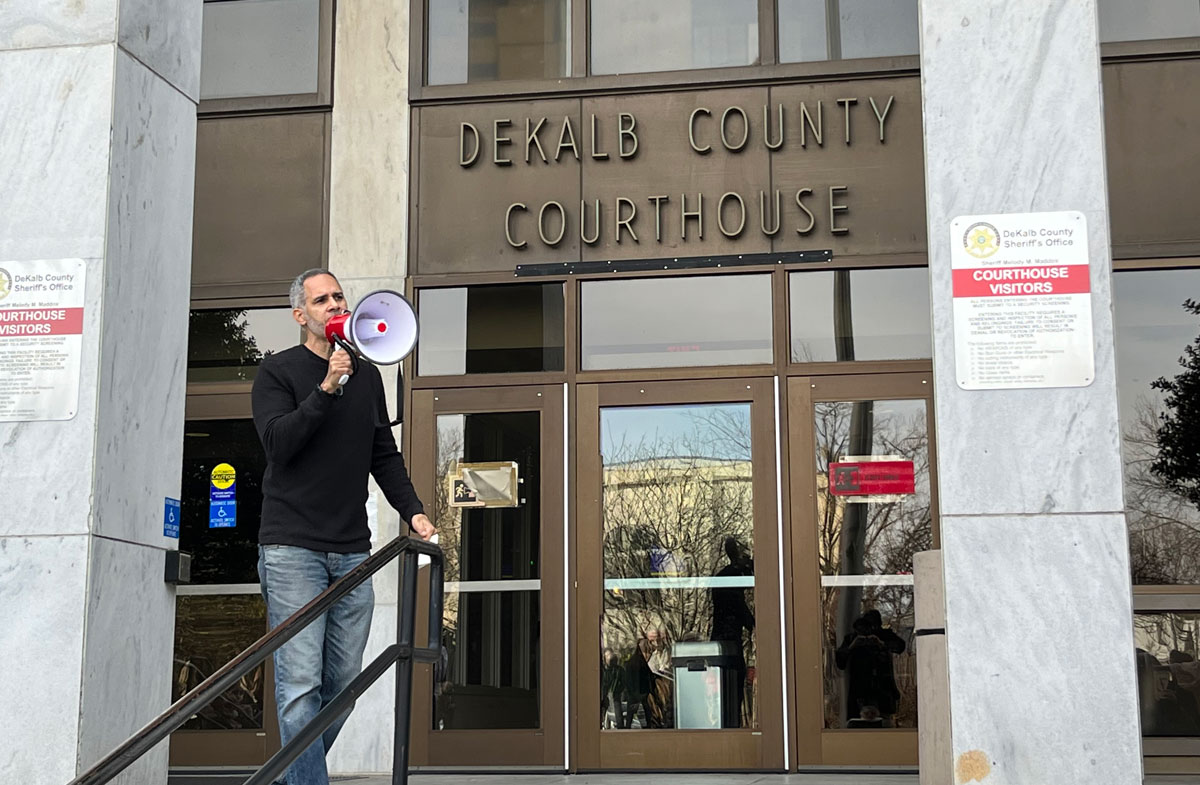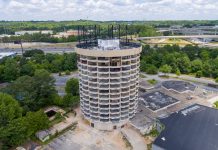
Photograph by Rachel Garbus
For many in attendance, it was a fitting way to spend Martin Luther King Jr. Day. “They arrested Dr. King 29 times—29 times!” Kamau Franklin told a crowd of around 70 protestors assembled in front of the DeKalb County courthouse, many of them part of a loose coalition of activist groups, environmentalists, and concerned citizens united against a planned 85-acre, $90 million Atlanta police and firefighter training facility in the South River Forest. That movement is known variously as “Stop Cop City” and “Defend the Atlanta Forest.”
Franklin is the founder and executive director of Community Movement Builders, which helped organize Monday afternoon’s rally in support of a group of activists arrested and charged with domestic terrorism in a police raid on the protest site last month. Other local human rights, racial justice, and policing alternatives organizations co-sponsored the event, including the Weelaunee Coalition, a decentralized network of neighborhood schools and families near the forest. In 2021, the Coalition facilitated a visit to the forest by members of the Muscogee (Creek) Nation, whose ancestral homelands include that land. (“Weelaunee” is the traditional Muscogee (Creek) name for the South River Forest, and many in the movement refer to the area as the Weelaunee Forest.)
The arrests took place on December 13, when a taskforce of several state and local police departments raided an encampment in the forest near the proposed training site. Several people had been living there for over a year, many in hand-built treehouses, with food and supplies provided by volunteers and mutual aid networks. Twelve tree-dwelling protestors, known within the movement as “forest defenders,” were arrested, and five received multiple charges, including domestic terrorism. A sixth person was arrested and charged the next day. Domestic terrorism is a state crime and comes with a mandatory sentence of between five and thirty-five years.
The Georgia Bureau of Investigation said in a press release that they made the arrests to “address criminal activity” at the forest encampment. They reported carjackings, destruction of property, and arson, and said that protestors threw rocks at police cars when they arrived on the scene. To remove protestors from tree dwellings, GBI said taskforce members “used various tactics,” which detainees and witnesses later said included use of tear gas and pepper balls.

Photograph by Rachel Garbus
The DeKalb District Attorney’s office has defended the domestic terrorism charges, saying that protestors’ use of violence justified such action. But activists and civil liberties groups have cried foul: leveling such extreme charges, they said, is an attempt to curb dissent.
“The usage of terrorist enhancement laws against protestors is a calculated political maneuver to silence widespread opposition to the Cop City project,” the protest group Defend the Atlanta Forest said in a December press release. “The GBI knows that these charges will not hold up in court, and they are not intended to: the point is to raise the stakes of protesting.”
Some civil liberties experts say the domestic terrorism charges are a legal bridge too far. “I think it is a very disturbing attack on free speech rights,” local civil rights attorney Drago Cepar, Jr. told Vice. “It points to the fact that they are trying to scare protesters into not protesting anymore.”
Even more alarming, some legal experts say, are comments made by Atlanta Police Department Assistant Chief Carven Tyus during a December 15th meeting of the training center’s advisory committee. According to Saporta Report’s John Ruch, who reported on the meeting, Cyus told members of the committee that APD had used Georgia’s hands-free driving law to arrest a person who was filming police outside the forest encampment. That alarmed some legal experts, who said that filming police officers on their jobs is a First Amendment right.
Cyus also said that simply coming to Atlanta from elsewhere to protest could be considered an act of domestic terrorism: “None of those people live here—they do not have a vested interest in this property,” Cyus told the committee. “And that is why we consider that domestic terrorism.”
Such accusations echo a wider national narrative, common in right-wing media since the racial justice protests of 2020, that blames “outside extremist” groups for infiltrating local communities to foment protests. The activists charged in the taskforce raid were from outside Atlanta, but the First Amendment provides wide constitutional protections for protest, including the right to cross state lines to do so. “That someone is engaged in protest activity and they’ve come from out of state cannot, does not, [and] will not make them a suspected terrorist,” former ACLU Georgia Legal Director Gerry Weber told Saporta Report. The Stop Cop City movement is known internationally in leftist activism circles, with the graffiti tag popping up in cities across the U.S. and as far as France and Switzerland.
Speakers at Monday’s rally at DeKalb County courthouse used the occasion of MLK Day to contradict the reasoning behind Cyus’ statements. “According to the logic of this ‘outside agitator,’ the Freedom Riders would have been terrorists,” said Matthew Johnson, interim director of Beloved Commune, an intentional community for Black organizers. “This highfalutin minister from Atlanta with a PhD . . . moving to Alabama to tell us how to run our state—now is this a terrorist too? Where do we draw the line?”
In the audience, listeners cheered and hollered, waving homemade signs; one chimed a musical triangle. A gaggle of children, some with their own signs, drew suns and trees with chalk on the courthouse steps. “Save the trees!” read one child’s sign.
Towards the end of the rally, which had been notably absent of any police presence, a dozen officers suddenly emerged from the DeKalb County courthouse, bellowing at protestors to “stay away from the flagpole,” where a musician had been playing guitar. For several tense minutes, police officers—at least one armed with an assault rifle—stood at attention on the courthouse steps, staring down protestors, who jeered and booed in response. The officers eventually went inside, shutting the courthouse doors behind them, but it was a striking reminder of the fierce and longstanding antipathy between police and activists who want their power curbed, which has only deepened in recent years.

Photograph by Rachel Garbus
The six protestors charged with domestic terrorist charges were released at the end of December on bonds ranging from $6,000 to $13,500. They’ve pled not guilty to all charges and are being represented by various counsel. Atlanta Solidarity Fund, which raised bond money for those charged, said on Twitter that they would help fight the charges, writing, “The ‘domestic terrorism’ charges these protestors are facing are utterly baseless.” As a condition of their release, the protestors are banned from contacting other movement activists on social media or returning to the forest site. An activist familiar with their cases said they were unable to speak with media while the legal process unfolds.
The rally-goers gathered on their behalf were defiant: leveling steep criminal charges against forest defenders would not deter the movement. While much media attention has been focused on the small group of activists who have committed acts of vandalism, the Stop Cop City movement is broad and diffuse, containing preschoolers and their teachers, indigenous leaders, environmentalists, human rights groups, labor organizers, and Black justice activists. That coalition isn’t going anywhere, said Franklin, the speaker from Community Movement Builders.
“We don’t have the money, we don’t have the police strength,” he told the crowd. “What we have is each other.”










![The North Carolina Museum of Natural Sciences’ newest exhibit is a [pre]historic first](https://cdn2.atlantamagazine.com/wp-content/uploads/sites/4/2024/04/DD-3-100x70.jpg)


